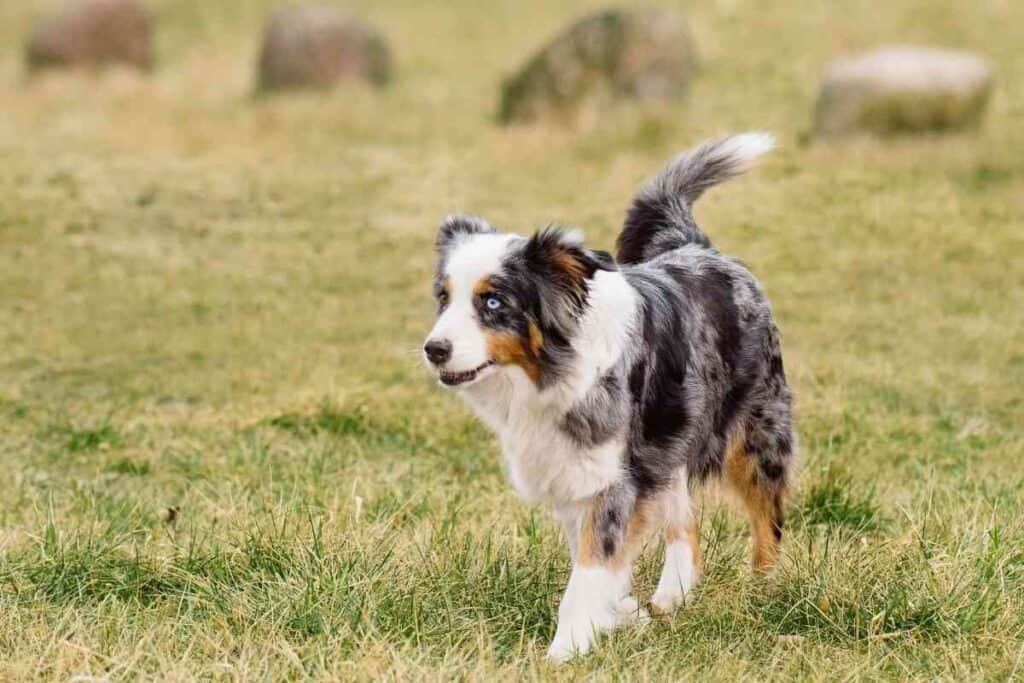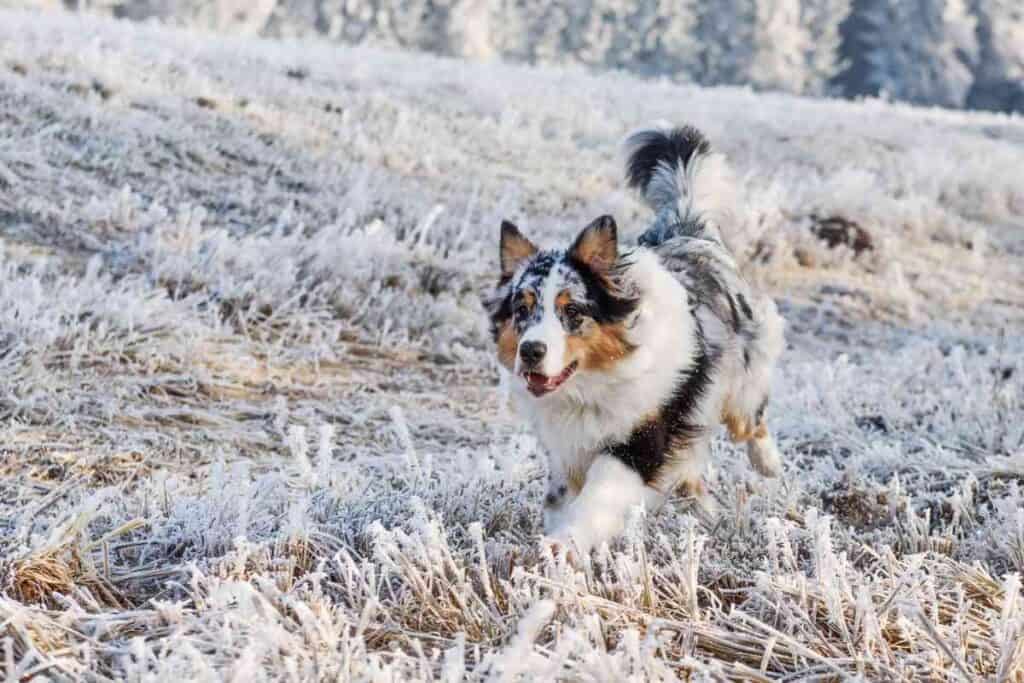When Do Australian Shepherd Puppies Stop Biting And How Can I Stop It?
My puppy is so cute, he is an Australian Shepherd, my first one, and I love his energy. As I go through this puppy phase, I want to know when I can expect him to stop biting. I want to be prepared for this phase, and I want to know when I can expect it to stop.
I decided to use my phone to do some reading and see what I could discover.
When Do Australian Shepherd Puppies Stop Biting And How Can I Stop It?
Australian Shepherd puppies will usually stop biting around ten months of age if they have been trained not to bite up until this point, but there are several factors that may extend this time longer.
Biting and nipping is a normal phase of a puppy’s life for every breed as their teeth grow from their milk teeth to adult teeth. At this time, the biting and nipping are related to their adult teeth coming in and the pain and discomfort that comes with it.
This is usually a temporary phase but should be redirected. It can be done by offering the Australian Shepherd puppy a teething toy that is designed to relieve their pain and discomfort while giving them something to do and distract them.
Biting or nipping for an Australian Shepherd is a breed characteristic related to what they were bred to do, herd livestock. When an Australian Shepherd herd livestock, it is typical for them to bite or nip to get the livestock to move and go where they want them.
This habit can be ingrained in them from birth, and during the puppy phase, it can be normal due to teething, but if not properly addressed early on, training can become a problem when their instincts kick in as an adult.

Training also can help with other behaviors that can also cause an Australian Shepherd to bite, such as guarding instincts and emotions.
This is why when your Australian Shepherd bites and nips as a puppy, they should be instructed that there is “no biting.”
Australian Shepherds are a working, herding dog that, like puppies, can suffer the same issues other breeds of puppies do, teething and nipping or biting due to this issue. Biting for a puppy of any breed happens as part of a normal growth process related to their teeth.
When the Australian Shepherd is a puppy, they will have their milk or baby teeth to start, and eventually, these teeth will transition to adult teeth.
During this transition phase, where the milk baby teeth fall out, and the adult teeth come in, puppies of any breed will suffer from pain and discomfort. This pain and discomfort can cause puppies to nip and bite anything and everything in sight to provide comfort and relief.
Even though this behavior can be expected for a puppy, it is essential to teach them that there is “no biting” in a matter-of-fact manner. There is no reason for harshness as they are too young to comprehend fully, but repetitive reminding can go a long way to teaching them what is allowed and expected.
At the same time, pet parents need to provide their puppies with teething toys that can provide relief and comfort at this difficult time and a much-needed distraction from their troubles.
It may seem like a lot to deal with, but keep in mind that you’re raising a baby animal. They are going through a lot of changes (their coats may even change color), so be patient and supportive.
For some dog breeds and particularly those working and herding dogs, nipping and biting can be instinctual as this is part of what they do to get the livestock to move.
While Aussies are not typically big chewers, they may struggle with issues related to biting and nipping. Therefore, it is a habit that should be addressed as early on as possible.

Training can begin early on with gentle but consistent reminders of the house rules related to chewing, biting, or nipping anything other than teething and chew toys.
Once the puppy is older and more mature, formal training can help them learn what is allowed and not, which may go against their breed background and instincts as a herding dog breed.
You may find also that your female Aussie is learning not to bite faster than your boy. While this may not be true in all cases, rest assured that your boy is learning at his own pace. He just can’t quite keep up with his sister!
When Do I Know If My Australian Shepherd Has A Biting Problem?
If your Australian Shepherd puppy doesn’t stop biting around ten months of age, it does not necessarily mean they have a biting problem. Not all puppies and dogs develop at the same time, some dogs might develop in this area sooner than ten months, and some will develop later.
Each dog is unique regardless of its breed and will develop according to its unique nature. The ten-month time frame is just that, a time frame and guide. Not all dogs will fit in that category.
Suppose your puppy grows into adulthood and continues to struggle with biting or nipping issues despite reminders and training, whether formal or from their pet parent. In that case, it can be helpful to consult a professional trainer or veterinarian.
Some breeds of dogs, as stated above, and even some dogs, regardless of breed, can struggle with issues related to nipping and biting due to breed instincts or something else like emotions and guarding or territorial traits.
How Can I Give My Teething Australian Shepherd Relief?
There are many ways to comfort your Australian Shepherd puppy when they are biting or nipping due to teething including providing teething and chew toys that can give them comfort and distraction or something simple like a washcloth that has been frozen for them to chew.
In some cases, depending on the dog, it can be comforting to rub the cloth on their gums if they will allow the pet parent to do so without nipping or biting.
Another great way to provide relief from teething and stop biting related to this is to provide a distraction. Distractions such as playtime, a walk, some outdoor fun, or something else will not physically take away their pain and suffering, but it may make them forget about it temporarily.
Coincidently this is also another great way to stop biting or nipping. Making a quick change in activities will have the Australian Shepherd puppy forgetting all about what they were doing, biting or nipping.
When they are done with playtime, the walk, or whatever was new, they can come back to their chew or teething toy and have a blast relieving their pain and discomfort while being more tired mentally and physically.
A tired puppy is also less likely to bite or nip as they will likely curl up in a comfortable spot and take a nap, which also relieves their pain and discomfort.
How Do I Stop My Australian Shepherd From Biting?
There are many ways to stop your Australian Shepherd puppy from biting; some work better than others, some are less effective. As a pet parent finding what works for you and our unique dog is essential.
The first method has you playing with your Australian Shepherd puppy until they begin to bite hard and hurt. At that time, letting a cry of the pain out will likely surprise the puppy, and perhaps they will come over and lick the body part in apology. At this time, return to what you were doing with the puppy.
This can be repeated a few times, and if it appears not to do much of anything, then a time-out method can be tried, which is similar to a time-out method for a child. Each time the puppy bites, they can be told in a matter a fact tone “no bite” and then placed in their crate or another area for a time out.
This can be repeated as often as necessary for them to get the idea. It should be noted that there are various ways to accomplish this training, and pet parents may have to experiment to find what works best.
What Else May Be Causing My Australian Shepherd To Bit Or Nip?
Other things that can cause an Australian Shepherd puppy to bite or nip include emotions like fear. Puppies that are afraid, scared, or suffering from other emotional or behavioral issues can end up biting or nipping accidentally due to stress.
Addressing their emotional or behavioral issues and adjusting their home life and environment can help reduce any stress they have and reduce biting or nipping.
Providing a loving home that is harmonious and positive for the Australian Shepherd to live can quickly reduce behavioral issues or emotional problems that can cause biting or nipping.
Since this is healthy for them on all levels, physically, and mentally it is essential regardless of whether they are biting or not.
Australian Shepherds: The Last Bite
Knowing when a puppy will stop biting regardless of its breed can bring comfort to pet parents who want relief from the complex challenges of puppyhood.
Thankfully, the Australian Shepherd usually outgrows this puppy habit around ten months of age once they have gotten their adult teeth in.
When this happens, this breed can sometimes continue to suffer issues of biting, which is instinctual but can be remedied with training and positive reinforcement and bring out their best behavior. At the end of the day, good behavior is all that matters.
